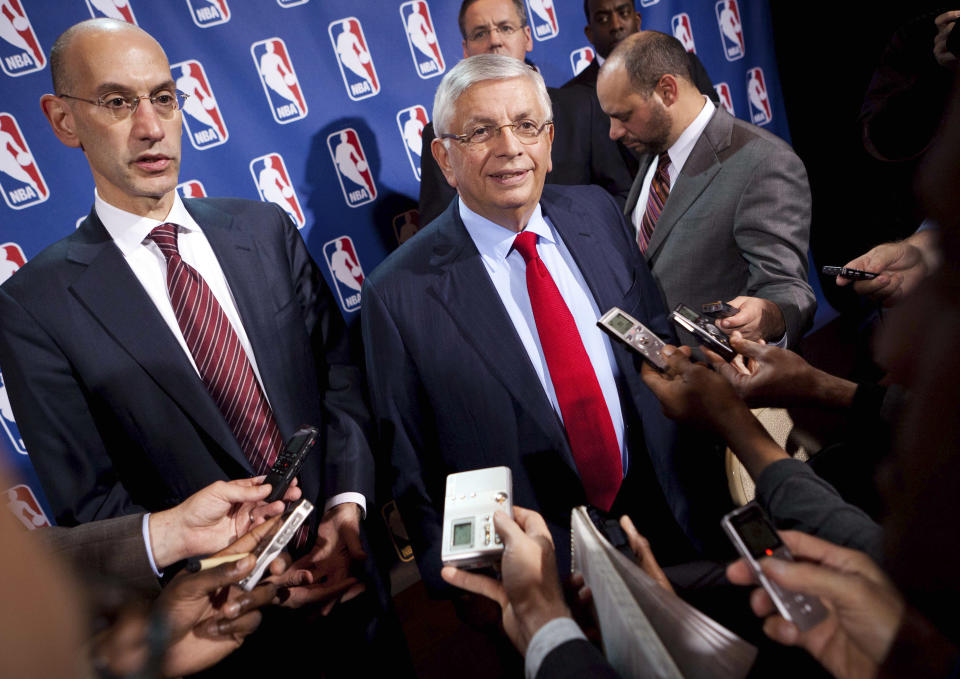NBA lawyer: Legal sports betting in America is 'the best place to end up'
Update: On May 14, the Supreme Court struck down the Professional and Amateur Sports Protection Act — effectively legalizing sports betting across the U.S.
On Dec. 4, the U.S. Supreme Court will at last hear the case of Christie et al vs. NCAA et al, which has been awaiting its day in the nation’s top court for six years.
What’s at stake in the case: New Jersey (led by outgoing Gov. Chris Christie) wants to legalize sports betting in the state, and if it wins the right to do so, other states are likely to follow suit in a rapid domino effect.
After SCOTUS hears the NJ case, regardless of the outcome, the NBA has big plans to lobby Congress for federal change and regulation to betting law, a high-ranking NBA lawyer revealed on a panel this week, moderated by Yahoo Finance, at the Sports Betting USA Conference in New York. This is something the NBA had not previously said until now.
“Our general position on sports betting is that it should be legal and regulated, pursuant to a federal framework that has minimum safeguards,” said NBA VP and assistant general counsel Dan Spillane. “We have advisors in DC, we have legislation that we’ve been pulling together, talking with other stakeholders in this area. It’s a slow process… When the leagues were all just unanimously opposed to it, it really wasn’t, I think, a practical discussion to have, and now it is… I think that there will be a little bit more clarity, and people will be more open, especially members of Congress, to talking about potential legislation once the [NJ] case is resolved one way or another.”
Why the leagues oppose the NJ case
Even though the NBA and most of the other leagues have indicated (or their commissioners have) that they do support legalized sports betting in America, the NCAA, NFL, NBA, MLB, and NHL all oppose New Jersey’s case, and sued to stop the state from passing its new law.
The reason the leagues are doing this has some nuance to it that bears explaining. But they want the change to be made at the federal level: they want the repeal of PASPA (Professional and Amateur Sports Protection Act), the 1992 federal law that banned sports betting everywhere in America but Nevada.
What they don’t want is for sports betting law to vary from state to state, which is what the landscape would look like, at least for a while, if New Jersey wins. That would be a mess, from the leagues’ perspective, to regulate and monitor: imagine if you could now place a legal bet on NBA games in states other than Nevada, but not in all states. (This is the current landscape the legal cannabis industry is dealing with, where eight states have legalized recreational marijuana, but it’s still illegal at the federal level.)
The NBA has been the de facto leader of the movement amongst the pro leagues. In 2014, NBA Commissioner Adam Silver wrote a New York Times op-ed, still widely cited today, arguing for the repeal of PASPA. But since then, some critics have said, it has not taken any significant action to make it happen. For three years, Silver has simply reiterated, at a number of public opportunities, the points he made in the 2014 op-ed. (In the time since Silver became commissioner, his predecessor David Stern has also come out in support of legalized betting.)

“We agree with New Jersey on the ultimate outcome”
On the Sports Betting USA Conference panel, Spillane of the NBA said that even though the NBA is against New Jersey in the Dec. 4 case, the league and the state are on the same side in their larger goal.
“Our view has been that if it’s illegal [at the federal level], that’s not the right way to start off legal sports betting in the United States — under a cloud, doing it in violation of federal law,” said Dan Spillane, vice president and assistant general counsel of the NBA. “At the same time, we agree with New Jersey on the ultimate policy outcome: that having legal, regulated sports betting in the United States is the best place to end up. The disagreement is just on how to get there.”
The most recent development in the New Jersey case took place last May, when the Third Circuit ruled 9-3 against New Jersey.
SCOTUS hears very few cases: 54 in 2016, which was fewer than in any of the five years prior, and it overturned the lower court ruling in 83% of them. Both of those stats are favorable for New Jersey: insiders believe the very fact that SCOTUS agreed to hear the case is good news for Christie.
“The fact is, they probably have got something to say here,” says Tom Russell, general counsel of Genius Sports, which tracks gambling data and analytics and sells it to partners including both legal sportsbooks and sports leagues. “Bearing in mind that all the local decisions have been against New Jersey, you would imagine that the thing they’ve got to say is different, something in favor of New Jersey.”
[Russell is the guest on our latest Sportsbook podcast; you can listen on iTunes or scroll to the bottom of this post.]

Pro leagues “need to be ready for a range of outcomes”
What matters most now, for the average American sports fans, is how the various pro leagues will react to the decision in the New Jersey case.
If New Jersey wins, experts generally expect a number of other states will rush to do the same: legalize sports betting in their state. If New Jersey wins, the attention will turn to getting PASPA repealed, on the thinking that SCOTUS hearing the case at all indicates that a repeal could happen.
Or it’s possible that New Jersey will lose and nothing in sports betting law will change.
All the pro leagues, Spillane says, “need to be ready for a range of outcomes… federal approaches, state-based approaches. We’ve been studying this and strategizing over it for a long time, and we’re ready for whatever happens.”
—
Daniel Roberts is the sports business writer at Yahoo Finance. Follow him on Twitter at @readDanwrite. Sportsbook is our sports business video and podcast series.
Read more:
NFL lawyer hints at league’s stance on gambling
MLS Commissioner: Columbus team move isn’t a done deal
MLB commissioner: ‘We are reexamining our stance on gambling’
